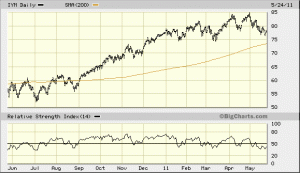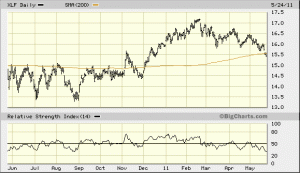Basic Materials ETF Consolidating, Financials Weak
Basic materials stocks have been in a strong uptrend ever since the beginning of QE2 reaching a peak at the end of April. Now they have been selling off along with the correction in commodities. The Basic Materials ETF IYM is approaching the lower end of the range and is within about $5 of reaching it’s 200 day moving average.
The industrial economy has been strong lead by agricultural, mining and construction equipment. We have noticed even in our skid steer attachments business that activity has been picking up steadily since the lows in 2009. It seems we are at an inflection point in the economic cycle where the markets are going to have to take over from the fed and government stimulus. It seem to me there is still a major hangover effect where people are reluctant to spend and are still in debt paying mode. It will be interesting to see if this trend can change in the next 6 months or if there will be a need for Ben to come along with QE3 next fall.
Financials Remain Weak
Another area that remains very week are the financial stocks and they are still at valuation levels that rival the lows in 1991. The government, FDIC fees and invasive regulatory requirements are the primary drags on this sector but again in this economy there is also still a lack of loan demand. It seems like we are stuck in a similar situation that occurred in the late 70’s and early 80’s where consumer confidence remained low and demand remained sluggish. I’ve been watching to see if the XLF
Financial ETF could hold support at the 200 day moving average, but it broke down through it yesterday and is trading lower again today. It may be one of those times when an undervalued sector just continues to get cheaper until there is a major change that spurs investor interest.
Everyone (except Ben Bernanke) has been so worried about inflation the past several months, it will be interesting to see if asset and commodity prices can remain strong as the fed backs away. If there is anything Bernanke understands it’s how demographics and debt trends can cause long periods of deflation and that is what he’s been trying to avoid. He was a vocal critic of how Japan handled their economy the past 20 years so don’t expect him to follow their lead.


